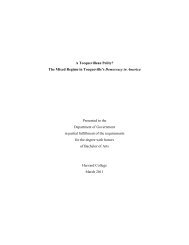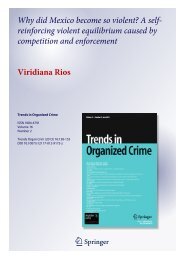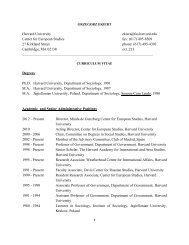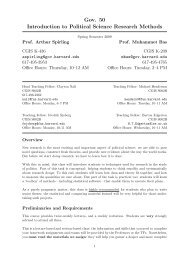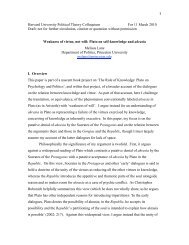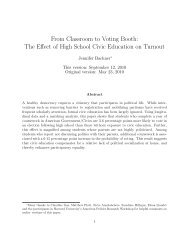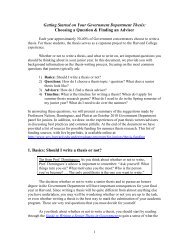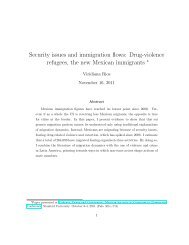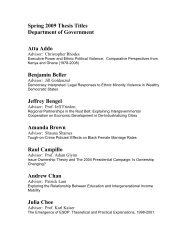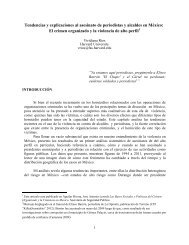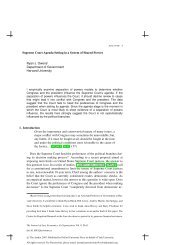Why are Mexican mayors getting killed by traffickers? The dynamics ...
Why are Mexican mayors getting killed by traffickers? The dynamics ...
Why are Mexican mayors getting killed by traffickers? The dynamics ...
Create successful ePaper yourself
Turn your PDF publications into a flip-book with our unique Google optimized e-Paper software.
3.2 Corruption supply: Prosecuting, ignoring or protecting<br />
Definition 3: A decides between rejecting b and prosecute N (e ≥ 0), and accepting b and<br />
protect N (e ≤ 0).<br />
Politicians decide how much they will enforce law given their capacity constraints. Law can<br />
be enforced against <strong>traffickers</strong> (i.e. prosecute) or in favor of them (i.e. protect). Politicians<br />
can also decide not to enforce (i.e. ignore). No enforcement means <strong>traffickers</strong> won’t be actively<br />
hunted; a de facto equivalent to decriminalization. Not enforcing is less compromising than any<br />
other option but gives fewer profits for politicians.<br />
<strong>The</strong> capacity to enforce of the state is a double-edge knife for <strong>traffickers</strong>. A strong government<br />
is an exceptional criminal protector but also, a threatening institution. A certain level of<br />
government strength is beneficial for <strong>traffickers</strong> because it allows corruption to be efficient <strong>by</strong><br />
securing that bribes will indeed buy what they <strong>are</strong> meant to buy: impunity.<br />
A very weak state may be entirely willing to contribute to <strong>traffickers</strong>’ wellness, but may be<br />
de facto unable to deliver what <strong>traffickers</strong> require. Securing say, an oligopolistic market for a<br />
DTO <strong>by</strong> prohibiting other organizations to sell or cross drugs in an <strong>are</strong>a, requires at the very<br />
least a government able to crush potential competitors and identify which members belong to<br />
each DTO. Tijuana local police, for example, famous during the 90s for protecting the Arellano<br />
Felix DTO, regularly beat up local gang members who were trying to become small drug traders<br />
in Mr. Arellano territory. Policemen were effectively protecting the oligopolistic benefits that<br />
Mr. Arellano’s bribes had paid for (Proceso 1995). If Tijuana government would have been<br />
unable to track and hunt gang members, Mr. Arellano would have found it completely useless<br />
to bribe them and would have to take c<strong>are</strong> of the cumbersome task of protecting his territory<br />
himself.<br />
<strong>The</strong> ability of the state to enforce along all its territory and levels is also beneficial for organized<br />
crime; such state keeps the price of bribing under control and ensures that agreements will<br />
bind. Bribing such state may indeed be expensive but it will never be as expensive as bribing a<br />
fractionalized state. When bribing one fraction of the state does not ensure that the agreement<br />
will bind in all the territory (as would be the case during a civil war), more bribes <strong>are</strong> needed 4 .<br />
In short, a strong state with ability to enforce and vertical control over its bureaucracy will<br />
ensure that <strong>traffickers</strong> bribe only one actor, keeping the price of bribes under certain affordable<br />
limits. If instead, several agents have legitimacy over one single territory, drug trafficking organization<br />
may need to spend more money to get the impunity and monopoly that they need<br />
4 Note that keeping bargaining power fixed, more bribes do not necessarily mean fewer profits for <strong>traffickers</strong><br />
(e.g. a same bribe may be divided among two bribees) but it does mean that trafficker’s profits will not be more<br />
than with a single actor.<br />
12



